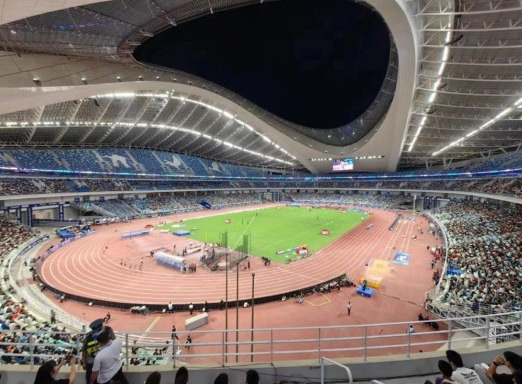China’s Spring Festival becomes international cultural event
By Ye Ban
In a workshop of Zigong Longteng Culture and Art Co., Ltd. based in Zigong, southwest China’s Sichuan province, the skeleton of a loong-shaped lantern was completed amid flying sparks from welding.
Loong, or Chinese dragon, the fifth sign in the traditional Chinese zodiac animal cycle, represents a totem of the Chinese nation. This year’s Chinese Spring Festival coincides with the Year of the Loong.
On the other side, a worker meticulously pasted and colored the scales of the “loong,” gradually revealing the enchanting charm of the lantern.
The lantern production process is complex, including designing, drafting blueprints, selecting appropriate materials for shaping, arranging lighting and drive systems, gluing, and painting, which requires many skilled workers.
During festivals, the lantern industry in Zigong can drive 100,000 people employment, including temporary labor, said Deng Peilin, chairman of Zigong Longteng Culture and Art Co., Ltd.
Lanterns are a symbol of Zigong and a crucial driver of local economic development. As early as the Spring Festival in 1964, the first lantern festival of the city was held, which bonded the city with lanterns.
After years of development, the lantern industry in Zigong today, including design, manufacturing, exhibition and other segments, has become increasingly specialized, with the industrial chain being continuously improved.
Nowadays, there are over 1,000 lantern-related companies in Zigong, with an annual output value of about 6 billion yuan ($830 million) and a share of 85 percent in the domestic lantern exhibition market.
Many of the orders received by Deng’s company were from overseas. “Thanks to the popularity of the Zigong lantern festival, lantern products are widely showcased at important exhibitions and major international sales platforms such as the Canton Fair. This ensures sales channels for our lantern products,” said Deng.
On Feb. 2 this year, the 30th Zigong International Dinosaur Lantern Festival officially kicked off. A group of lanterns featuring “nian” (year in Chinese), a mythical beast thought to have preyed on people and livestock at the turn of the year in Chinese myth, attracted many visitors. These giant mechanical monsters swayed their heads and roared from time to time.
Weighing over 10 tons, these “beasts” can flexibly complete more than a dozen moves, said Zhong Yi, chief planner of the lantern fair. Zhong noted that these “beasts,” made by colorful lamp craft combined with simulated dinosaur mechanical drive, were equipped with “AI brains,” enabling them to “talk” with visitors.
The Zigong International Dinosaur Lantern Festival hosted each year is a feast of excellent craftsmanship, materials, and design concepts.
For instance, a lantern set for the first time used water-soluble resin molding, making the characters’ faces almost lifelike.
Design concepts of lanterns are also updated. Popular game and trendy toy characters have been made into lanterns, and the lantern fair used spray guns and airbrushes to depict color gradients, creating a visually dazzling effect.
It is learned that Zigong’s lantern industry holds over 160 patents and 7,000 lantern copyrights. In 2023, Zigong’s lantern companies undertook over 200 colored lantern projects.
Continued innovation relies on the support of talent. Sichuan University of Science and Engineering established China’s first lantern school. Zigong Vocational and Technical College has set up a colored lantern major. Every year, over 2,000 “lantern craftsmen” are cultivated in Zigong.
On Feb. 11, a Chinese lantern festival was hosted in Montauban, France, which received a total of more than 300,000 visits. Huang Mingshu, who heads an overseas engineering team of Zigong Lantern Group and participated in organizing the lantern festival, said he was proud as a part of the event.
Last September, Huang and his team went to France for the preparation of the lantern festival. “We had a team of over 80 people, including all the necessary trades for designing, producing, and installation,” he said.
The materials and semi-finished products for making the lanterns were transported by China-Europe freight trains or by sea, and then further processed by the team on-site. It took about three months to complete the installation.
In 1990, Zigong lanterns made their first appearance overseas in Singapore. Since then, they have been exhibited in over 80 countries and regions, capturing 92 percent of the overseas lantern exhibition market.
In 2023, lantern enterprises in Zigong launched 90 overseas projects, achieving a cultural export value of $50.61 million.
Zigong has also established a lantern metaverse research and development center, which extensively applies technologies such as holographic projection and laser water curtain films to overseas lantern festivals.
Culture becomes more colorful because of communication. At the lantern festival held in France, visitors could enter a fantasy world composed of scenes such as the vast starry sky and mysterious forest, guided by a “magical hat.” Chinese elements such as landscapes and giant pandas were interspersed with Western cultural elements.
“We have introduced cartoon characters like Snoopy and Peter Rabbit at the lantern festival, and also used lanterns to interpret picture books by foreign authors. These exhibits were highly appreciated by foreign visitors,” said Li Zhongwen, general manager of the international market department of Zigong Lantern Group.
Lanterns are manufactured in a workshop of an industrial park in Zigong, southwest China’s Sichuan province. These lanterns will be shipped overseas upon completion. (Photo by Qiu Hongbin/People’s Daily Online)




